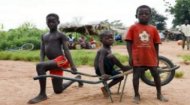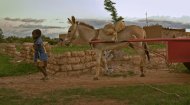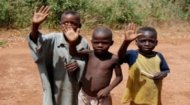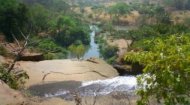Burkina Faso History
The modern day country of
Burkina Faso, meaning 'the country of honourable people' is a neighbour
to Mali to the north, Niger to the east, Benin to the south-east, Togo
and Ghana to the south and Côte d'Ivoire (Ivory Coast) to the south-west.
 With a
population today of some 16 million people known as Burkinabè, its history
can be traced back to around 14,000BCE when it was populated by hunter
gatherers. With a
population today of some 16 million people known as Burkinabè, its history
can be traced back to around 14,000BCE when it was populated by hunter
gatherers.
As with so many nations without natural
boundaries, Burkina Faso was home to numerous peoples, however its centre
was inhabited by Mossi kingdoms (left) that were to become a French protectorate
in 1896 as part of the Scramble for Africa after French colonial forces
defeated the Mossi kingdom of Ouagadougouin that year. Over the next two years
further military action saw most of what it now Burkina Faso come under
French control, albeit with ongoing pockets of resistance.
In 1919 the territory become a separate
constituent territory of French West Africa with the name Haute Volta
with François Hesling as its first governor in response to fears of armed
uprising against French colonial rule.
 However in September 1932 the
colony was dismantled altogether and divided up between Côte d'Ivoire,
French Sudan and Niger with the former receiving the largest share
including the country's present day capital of Ouagadougou. However in September 1932 the
colony was dismantled altogether and divided up between Côte d'Ivoire,
French Sudan and Niger with the former receiving the largest share
including the country's present day capital of Ouagadougou.
As elsewhere in Africa,
World War II showed to native Africans that 'white man' should no longer
to be considered invincible, and, against a backdrop of nationalistic
fervour sweeping across the continent, the French took heed of
anti-colonial agitation and restored the colony to its former state and
boundaries on 4th September 1947. In 1958 the colony became an autonomous
republic within the French Community and two years later achieved
independence as the Republic of Upper Volta with Maurice Yaméogo (right) as its
first president.
 Soon after, Yaméogo banned all political parties apart
from his own and he clung to power until a military coup in 1966 when he
was deposed following a series of widespread demonstrations from
students, unions and civil servants against the state of the country and
living conditions. Soon after, Yaméogo banned all political parties apart
from his own and he clung to power until a military coup in 1966 when he
was deposed following a series of widespread demonstrations from
students, unions and civil servants against the state of the country and
living conditions.
This coup was to define the history of Burkina Faso (so renamed in 1984)
for the next few decades with repeated military coups throughout the 1970s and
1980s until the country's former president, Blaise Compaore (left), come to power in a
further such a coup in 1987. Whilst there are now multi party elections, Compaore won each and every one
since then until his forced resignation in 2014 . The video (right) explores the histtory of Burkina Faso in more details.
Today Burkina Faso is a poor country even by the
standards of West Africa with poor life outcomes for its people. Badly affected
by droughts, the country's economy has also suffered from regional instability
with migrant workers unable to find employment in the Ivory Coast following
recent events there. The situation in Burkina Faso is currently marked by a dramatic increase in violence, with almost 1,800 people reported to have been unlawfully. In addition, the military rule has been extended for another five years by the acting president, Captain Ibrahim Traoré, who seized power following a coup in 2022. |
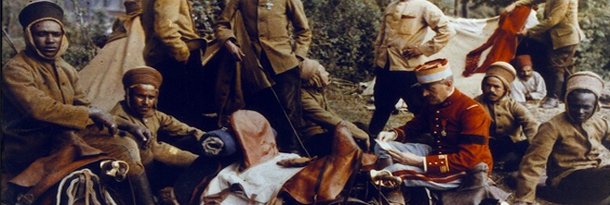
 With a
population today of some 16 million people known as Burkinabè, its history
can be traced back to around 14,000BCE when it was populated by hunter
gatherers.
With a
population today of some 16 million people known as Burkinabè, its history
can be traced back to around 14,000BCE when it was populated by hunter
gatherers.  However in September 1932 the
colony was dismantled altogether and divided up between Côte d'Ivoire,
French Sudan and Niger with the former receiving the largest share
including the country's present day capital of Ouagadougou.
However in September 1932 the
colony was dismantled altogether and divided up between Côte d'Ivoire,
French Sudan and Niger with the former receiving the largest share
including the country's present day capital of Ouagadougou.  Soon after, Yaméogo banned all political parties apart
from his own and he clung to power until a military coup in 1966 when he
was deposed following a series of widespread demonstrations from
students, unions and civil servants against the state of the country and
living conditions.
Soon after, Yaméogo banned all political parties apart
from his own and he clung to power until a military coup in 1966 when he
was deposed following a series of widespread demonstrations from
students, unions and civil servants against the state of the country and
living conditions.